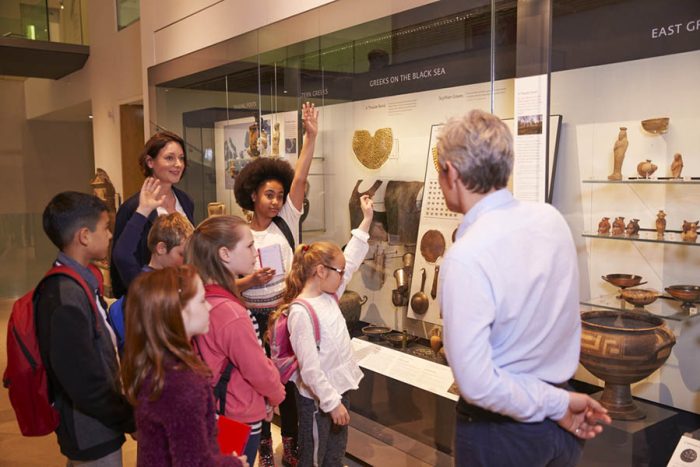To ensure a successful school trip, careful planning is essential. Discover our tips on how to plan an educational visit of the year that meets learning outcomes while also providing an enriching experience for your students.
Planning a school trip abroad can be one of the most rewarding experiences you offer your students, helping to bring their classroom learning to life. Whether you’re focused on history, language, art, or STEM, an educational trip not only broadens students’ horizons but deepens their subject knowledge in unforgettable ways.
Here is how to plan an educational visit that not only achieves learning objectives, but also offers a rewarding experience.

1. Define the learning objectives
Before booking a trip, outline clear learning goals. Whether your focus is cross-curricular, language immersion, or curriculum-specific objectives for subjects such as history or geography, it’s important to select a destination that aligns with your aims.
- History trips to popular destinations like Berlin or Normandy can provide powerful insights into WWII, while art tours to Paris or Florence will inspire creativity in budding artists.
- Cross-curricular tours can blend various subjects, offering a broader educational experience. A visit to the Futuroscope in France or the iconic museums of New York provides opportunities to explore science, technology, history and art all at once.
2. Choose the right destination
Once you’ve set your objectives, selecting the right location is the next big step.
Europe offers countless options, each catering to different subjects and age groups. Normandy is a perennial favourite, offering not only historical insight into D-Day and medieval France, but also language immersion opportunities.
For something more adventurous, consider trips to Iceland for geography students or New York City for performing arts enthusiasts.
Think about how your destination complements your learning goals:
3. Plan a balanced itinerary
Balance educational activities with cultural experiences and downtime. A well-structured itinerary should include excursions that support learning, but also give students time to relax and bond. For instance, after a tour of ancient ruins in Greece or a museum in Paris, consider including a cultural experience like a local meal or a visit to a theme park.
Remember to factor in time for reflection, whether that’s built into an evening debrief or quiet journaling time in the schedule. Students need space to absorb what they’ve learned.
4. Prioritise safety and support
Safety is paramount on any school trip. Partnering with Travelbound ensures all travel, accommodation and excursions meet strict safety standards. We also hold accreditations such as ABTA and ATOL, and provide support on risk assessments.
Our Travelbound team also offers 24-hour support throughout your trip, plus operates a Safety Management System. Speak to your dedicated Travelbound Tour Coordinator to learn more about support when abroad.
5. Involve the students
Engage students in the lead-up to the school trip to build excitement and ensure buy-in. Host a presentation or Q&A about the destination, explaining how the trip connects to their studies.
You can also let them help with fundraising efforts or researching local customs and attractions. Not only does this prepare them for the trip, but it also gives them a sense of ownership.

6. Handle logistics early
Like with planning your school trip early, it’s important to have a clear understanding of what information your Tour Coordinator needs from you in relation to your group.
There are some key logistics to consider, including passports, visas (where necessary), permissions, insurance and payments. Start as early as possible to avoid last-minute stress.
- Be clear on deadlines for deposits. This will help you create a clear payment plan for parents.
- Ensure students have up-to-date passports. Communicate to your students their passports should be valid for at least 6 months beyond the date of your planned departure from the destination country.
- Don’t forget about travel insurance for the group.
7. Communicate with parents/guardians
Working in education, you’ll already know keeping parents informed is essential. Send out regular communications, from initial interest letters to detailed itineraries and packing lists.
Hosting a parents’ evening for the trip will allow you to answer any frequently asked questions in one hit. It is also an opportunity for you to reiterate the value of learning beyond the classroom and emphasise the learning outcomes.
Highlight the safety measures in place and provide a clear code of conduct for students while abroad. This will also reassure you that you can lead the school trip with confidence.

8. Make the trip memorable
A successful trip isn’t just about hitting academic goals; it’s about creating lifelong memories.
Include unique experiences that will leave a lasting impression on your students, whether it’s an interactive history lesson on-site at a historical landmark or a performance in a world-renowned theatre. Make sure students come home with a deeper understanding of their subject and a new appreciation for the world around them.
In need of some added inspiration for your next school trip? Explore our range of engaging destinations, itineraries and excursions. Alternatively, complete our quote form and speak to a member of our Travelbound team.




Comments are closed here.